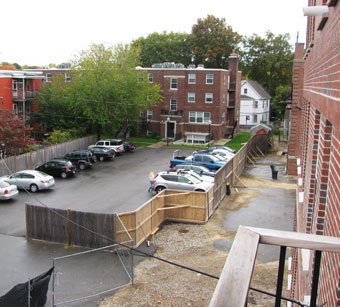Hearing could cost developer control of site

The Cambridge Crossing development on Yerxa Road and Rindge Avenue in North Cambridge remains a mix of finished and unfinished buildings, as it was in October. (Photo: Marc Levy)
A hearing Thursday in Boston will decide whether developer Joseph Perroncello gets an extension on filing plans to exit bankruptcy protection, with control of his “Cambridge Crossing” site on Yerxa Road and Rindge Avenue either staying with him or potentially going to Webster Bank, court documents show.
While Perroncello’s bankruptcy has cost him control of two of his nearly two dozen developments and projects in high-end locations such as by Boston’s Faneuil Hall, events in Cambridge have been leaning in his direction. A criminal case based on the poor condition of his Cambridge Crossing construction site was dismissed Dec. 21 when a judge found it was cleaned adequately after seven months of city threats inspired by years of neighbor complaints. And an auction sale of that property was delayed a third time Jan. 26.
Quincy-based Daniel J. Flynn & Co. Inc. has the auction scheduled for May 25. When the sale was first scheduled for Sept. 15, neighbors feared Perroncello would figure out a way to buy back his own property, but the delays make such a trick unnecessary.
The 2.2-acre, L-shaped site consists of three buildings: one at 45 Yerxa Road in which 14 of 19 apartments are occupied, albeit consistently on an illegal basis since Perroncello has lacked a certificate of occupancy; and two at 120 and 122 Rindge Ave. that will add 44 apartments. The developer describes the site as being 75 percent done and needing $3.5 million to get it the rest of the way. He says he has already put in $9 million of his own in addition to Webster Bank’s $15.5 million first mortgage on the site.
Neighbors have called the construction a six-year nightmare of mess and rats, after-hours work and cracking foundations, but complaints have dropped off over the years as Perroncello has been dragged into compliance with city laws or as people have simply wearied of the fight. An e-mail read into the record as long ago as May 2009 had one resident saying:
“I’m not fighting anymore. My blood pressure has been off the charts for the past three months and I have a bad stomach. My doctor told me to relieve stress and not get worked up anymore. I signed a paper today to telling Joe [Perroncello] to go ahead. I feel bad about this whole situation, but he is going to keep on going until he gets what he wants, and I am just sick of the whole thing.”
In that portion of the meeting, neighbors discussed how issues at the Cambridge Crossing site they thought had been settled to their satisfaction were returning for approval by city boards.
Opposing motions
It is Webster opposing Perroncello’s request for an extension on filing plans to exit Chapter 11 bankruptcy protections — or, more technically, for an “exclusivity” period in which he and his One Twenty Cambridge Realty Trust can be the only entities filing such plans. Perroncello made the request March 3, the same day his initial exclusivity ended, and Webster filed a motion opposing the request the same day.
“With respect to Webster Bank’s secured claim, the debtor merely states … ‘he has been engaged in discussions with potential financiers of the Cambridge project …’ There is no reference as to the identity of any lenders, the amount sought or financing terms,” wrote the bank’s lawyer, Thomas S. Vangel of Boston’s Murtha Cullina LLP, referring to Perroncello. “Based on the information provided in the motion, the debtor is no further along than he was 120 days ago when the case was commenced. In the four months that have elapsed since the petition date, the debtor has made no written proposal to Webster, nor has there been any negotiation with regard to any proposal. The debtor has not been able to demonstrate any ability to finance a plan of reorganization.”
Perroncello’s 21-page motion — which helpfully includes a two-page order accepting his proposal that Judge Frank J. Bailey would have to only date and sign — talks repeatedly of his assets and the profitability of 20 of them from rentals, as well as him being “substantially current with his obligations to the lenders holding mortgages against these properties.” (The developer’s lawyers take it further by noting he has “little if any prepetition liability to vendors, suppliers, tradesmen, contractors or credit card companies.”)
Everett attorney Richard A. Mestone described Perroncello’s owing between $10 million and $50 million and his assets as being between $50 million and $100 million. Perroncello’s Boston home, a Beacon Street mansion, has a total assessed value of $5 million.
While the ongoing profitability of 20 high-end rental properties and his ownership of such valuable properties could raise questions as to how Perroncello can claim to be bankrupt at all, Vangel goes on to say in Webster’s opposing motion that the developer has also failed to pay required post-petition real estate taxes, file required financial reports on time or at all and violated court orders in other ways as well. The bank’s attorney also noted $1.2 million in back taxes owed by Perroncello in Boston and $157,957 owed in Cambridge.
Finally, the bank seems peeved Perroncello, who filed for bankruptcy protection Nov. 3, waited to “beyond the eleventh hour” — after 4:30 p.m. on the last possible day — to file for an extension instead of filing a plan.
Perroncello and Vangel are to argue the issue at 11 a.m. Thursday in Courtroom 3, on Floor 12 of the courthouse in 5 Post Office Square, Boston.

